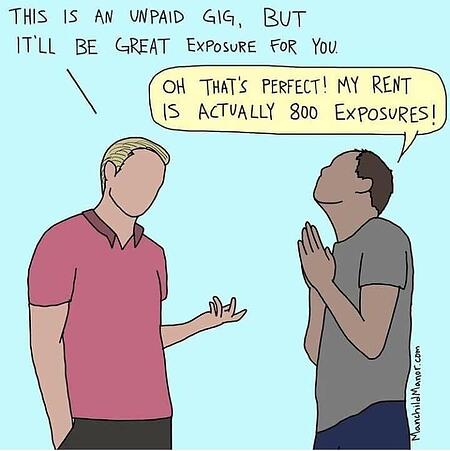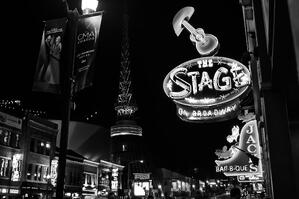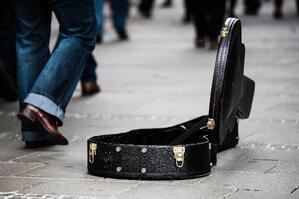Making money in the music industry can be seen as quite the white whale, especially for live musicians, but when you're starting out, is it worth taking a financial hit just to be seen? We look at the pros and cons of playing for free, some tips to start earning from your gigs and events and the knock-on effect playing without pay has on musicians across the globe.
Let's start with an example. Whilst studying music at University, one of our members of staff was expected to book a tour as part of one of their modules. A London-based venue responded to their EP with an offer to play, but informed them that they would be required to sell 20 tickets at £10 each and make up the difference of any they didn't. Why go through with such a gig we hear you ask? Well, Happy Mondays' Bez was headlining a DJ set and they thought it could be good exposure, especially as they were based in a different city. It wasn't, and they ended up having to pay over £150 for the privilege.
You may not have experienced such a scenario yourselves, but we can guarantee you've justified playing for free because of exposure. It's a word that you'll hear countless times, and not one that's limited to aspiring musicians.
Playing for exposure
In a recent blog article, Scanner detailed an encounter with a well-known music hardware company that wanted him to perform at an event, one where they could cater him with food and drinks, but not accommodation and no real payment, arguing that the exposure would be his fee. “Exposure is not payment” elicited Scanner.
 Image credit: ManchildManor.com
Image credit: ManchildManor.com
Similarly, as Last Minute Musicians points out, the Super Bowl doesn’t pay performers during the iconic half time show and only covers their expenses, yet the audience of Super Bowl LII last year was 103.4 million. Are they justified? Perhaps, but Last Minute Musicians argues what kind of example does this set for venues and promoters booking musicians?
Unfortunately, this issue only really exists for live performers. For those of you who go into careers that see you provide music for film, television, games, radio etc., you will receive a fee for your time and services. Sadly, such a system doesn’t exist within live music. So when, if ever, is it ok to play for free?
In an article by Reverb.com they take this issue and add some real cash to break it down. A 4-piece band is offered $500 to play a gig. Broken down between each player the hourly rate sits at $25, which when equated to an annual salary is similar to a night manager in Arby’s, or a UK branch of Subway.
That’s all well and good, but Reverb.com then posits, what if that gig was for nothing? Would the exposure, mailing list signups, merch sold and/or pure enjoyment be enough to fill that $500 gap? That’s up to you really, but by playing for free you run the risk of undermining your fellow musicians, both aspiring and established. It may sound a bit doom and gloom, but setting a precedent that musicians are willing to take the hit in favour of exposure could potentially lead to more venues treating it as the norm, making it harder for you to negotiate a fee.
A middle ground
Alternatively, it’s possible to arrange compromises when playing live music without being completely out of pocket.
Scanner acknowledges that, “Perhaps at the beginning of my career I would have performed for food and drinks, when I was trying to establish some kind of context and exposure for my work, but without wishing to sound too arrogant I truly feel I’m beyond this now.”
For artists working their way up the ladder and building their fanbase, a gig that covers expenses and/or supplies them with food and drink is the next best thing to being paid in those early days.
Most venues aren’t trying to fleece live performers as they’re part of the lifeblood that brings people through the doors, but they’ve obviously got overheads to consider too. In these instances, a compromise is a great way to still play and potentially win new fans, but also form a positive relationship with that venue that could lead to paid gigs.
As we said in our article about maximising your time at university, you will be remembered for how you make people feel. If you make a good impression, are reliable and are easy to work with, chances are your name will come up for future gigs and be passed between venues and promoters.
Steps to getting paid
We realise that we’ve still not explicitly said whether it’s ok to play for free, and to be honest, the decision rests with you. Organisations like the Musician’s Union and Work Not Play exist because this issue has existed for a long time, and there’s a very real concern that with the continuing impact of illegal downloading and streaming, artists that rely on live revenue will soon be unable to continue.
Becoming a member in one of these organisations gives you a collective weight when negotiating a fee for your time, skill and expenses, but the most important takeaway from this article is knowing when you should fight for that fee and when it’s more important to compromise and focus on building relationships with local venues, promoters and your audience.
However, to really help your chances of negotiating a fee for your next live appearance(s) we suggest following these 6 steps to ensuring you're both an attractive proposition and that you're not missing some key opportunities.
 1. Know where to play
1. Know where to play
Even if you’re an artist/band that’s playing a widely accepted and enjoyed genre, there will be venues and crowds that just won’t be into you. Do your research, see what genre(s) get the most attention at specific venues and find the perfect fit for you.
 2. Busking
2. Busking
It’s not as glamorous, but busking can be an excellent way to raise your profile and funds. The more visual your performance the better, as you stand a better chance of catching people's attention.
 3. Social Media presence
3. Social Media presence
Pitching yourself/your band to a venue? Chances are they will want to look you up and in today’s world a musician with no social media presence is one that will be overlooked. It’s become the bane of many professional musicians’ lives, but unfortunately it’s a key component to your success.
 4. Merch
4. Merch
Though this requires the initial outlay to create, merch has the potential to foster a relationship between audience and artist, expose you to others and cultivate a more professional appearance.
Image credit: Matthew McAndrew via Flickr
 5. Support shows
5. Support shows
When you’re still in your infancy and only have your friends to attend, it’s next to impossible to command a fee. However, if you find an artist of a similar sound that’s established a good audience, a support show can introduce you to a new set of ears that could become your future fans.
 6. Private Events
6. Private Events
The idea of being a cover artist/function band may not appeal to you, especially when you’re trying to create an original offering, but these can be easy ways to make money for live music, that can be used to subsidise your other musical endeavours.
FIND OUT MORE
musiciansunion.org.uk
worknotplay.co.uk


